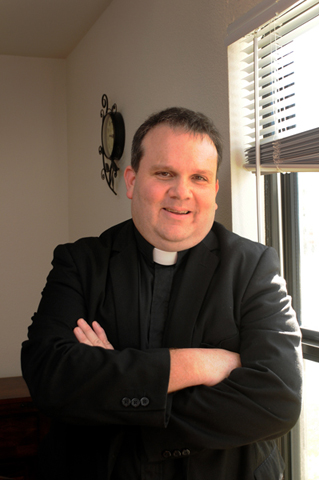
Fr. Ray Leonard at his home in St. Mary’s, Ga. (RNS/The Star-Ledger/Nancy Reynolds)
Fr. Ray Leonard knew not to wear the clerical collar identifying him as a Roman Catholic priest. It almost certainly would have gotten him deported.
He knew not to celebrate Mass, hear confession or baptize a child. The acts might have resulted in harassment -- or worse, arrest and imprisonment -- for the families Leonard cared about.
During a decade spent teaching and helping the needy in some of China’s most impoverished and oppressed regions, the New Jersey priest learned what it was like to live in a land without religious freedom.
It kindled a greater appreciation for his liberties at home. Which is why Leonard, 51, bristled at the U.S. government when it told him he couldn’t hold services at a Georgia naval base during last month’s government shutdown. Leonard, a civilian contractor on the base, wasn’t deemed an “essential” employee.
In a case that made headlines across the country, Leonard filed suit against the Department of Defense, contending the directive violated his freedom of speech and his right to religious expression.
“I’ve lived under a system where somebody else dictated to you when, where, how and what type of religious service you can have -- or not have -- and I’m not going to come home to my country and call it the land of the free and the home of the brave and allow anyone to tell me, ‘You can’t have church this weekend,’ ” Leonard said.
The Thomas More Law Center, a conservative Christian advocacy group, filed the suit Oct. 14 on behalf of Leonard and one of his parishioners at the Kings Bay Naval Submarine Base. A day later, the Defense Department retreated, allowing Leonard and other priests who work as civilian contractors to return to ministry at bases around the world.
Even so, Leonard is pressing on with the suit, saying he wants to ensure that Catholic service members won’t be barred from attending church or receiving the sacraments under future shutdowns.
Leonard drew a similar lesson from the Tibetan monks he worked with in China. Their ancestral land annexed, their activism met by brutal reprisals from the government, the monks continue to press for their freedoms, he said.
“The monks taught me that if anyone is infringing on your rights, you better do something about it, or you’ll wake up a slave,” Leonard said. “You’ll have no freedoms.”
Leonard didn’t set out to be a standard-bearer. Missionary work was more his dream.
He graduated from the Society of the Divine Word’s college seminary in Iowa. But in the mid-1980s, China largely remained a closed society. Catholic missionaries weren’t welcome, Leonard said.
He chose parish work instead, completing his religious formation at a diocesan seminary, Mount St. Mary, in Maryland. He was ordained in the diocese of Metuchen, N.J.
Though he enjoyed the pastoral work, China continued to tug at him, and by 2000, the country was more accessible to foreigners.
Metuchen, N.J., Bishop Paul Bootkoski granted Leonard leave from the diocese in 2002.
Within 15 months, he found himself in a community of date farmers in Shaanxi Province, in north-central China.
Living in spare, stone-block quarters, Leonard taught four English classes a day. Proselytizing was out of the question. The police had made clear it was forbidden.
“I was more teaching religion by my deeds and my life,” Leonard said.
It was during a trip to Beijing that Leonard learned of a need for a teacher in an even more remote area thousands of miles to the west.
Qinghai Province sits almost 2 miles above sea level on the Tibetan Plateau. It would be his home for four years.
But the priest became deeply frustrated by the Chinese government’s treatment of the Tibetans.
The government, he said, forcibly removed some residents, confiscating their yak herds, and relocated them to cities to supplement the labor force. Many people ended up begging on the streets, Leonard said.
Following riots in 2008, the police came around more frequently, demanding Leonard’s papers and questioning him. Travel restrictions were imposed on foreigners, and after a visit home in 2009, Leonard had a hard time getting back.
He finally did, but amid a continuing government crackdown, he worried his presence might do more harm than good by inviting police attention.
“The Tibetan area became just too risky,” Leonard said.
Leonard left for good last year.
For a time, he considered another foreign mission.
Then he heard about the contract position at the naval base in St. Marys, Ga. Because of a shortage of active-duty priests, contractors work at about 50 bases worldwide, he said.
Leonard was just a few days into the assignment when the shutdown kicked in. A sign on the chapel door informed him all Catholic services, including religious education, would be indefinitely suspended.
He offered to work without pay, but the Navy refused.
“I was incredulous,” Leonard said. “It was a slap in the face to all our Catholic service men and women. This is a very important part of their lives.”
He contacted the Archdiocese for the Military, which put him in contact with the Thomas More Law Center.
Within days, Leonard had become the face of the resistance.
Through the lawsuit, he hopes to have contract priests recognized as essential personnel or force the military to allow clergy members to volunteer during shutdowns.
Anything less, he said, amounts to tyranny.
[Mark Mueller writes for The Star-Ledger.]
